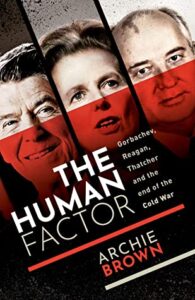 An individual leader’s acceptance of democratic norms and values can play a vital role in facilitating the development of civil society and political transitions, says a leading expert.
An individual leader’s acceptance of democratic norms and values can play a vital role in facilitating the development of civil society and political transitions, says a leading expert.
Russia will allow U.S. Under Secretary of State Victoria Nuland (right) to visit for talks despite having previously blacklisted her, after Washington agreed to lift a similar restriction placed on a Russian citizen, Moscow said on Sunday, Reuters reports. The U.S. official, who is expected in Moscow from Oct. 11 to 13, visits at a time when political ties between the countries are badly strained. She will meet senior officials to discuss bilateral, regional and global issues, the State Department has said.
Professor Archie Brown’s latest book, “The Human Factor: Gorbachev, Reagan, and Thatcher, and the End of the Cold War,” is an investigation of the role of individual political leaders, including Mikhail Gorbachev, in the end of the Cold War, the collapse of the U.S.S.R. and political transitions, says Felix Light.
 It is worth summarizing twelve remarkable achievements which owed more to Gorbachev than to anyone else in the Soviet Union which were appreciated at the time, even if increasingly forgotten, not least in Russia, thereafter, he writes for the Moscow Times:
It is worth summarizing twelve remarkable achievements which owed more to Gorbachev than to anyone else in the Soviet Union which were appreciated at the time, even if increasingly forgotten, not least in Russia, thereafter, he writes for the Moscow Times:
- First, the introduction of glasnost and its development into freedom of speech and publication;
- second, the release of dissidents from prison and exile and the resumption of rehabilitations of those unjustly repressed in the past;
- third, freedom of religious observation and the ending of persecution of the churches;
- fourth, freedom of communication across frontiers, including an end to the jamming of foreign broadcasts and a developing freedom to travel or to emigrate;
- fifth, the introduction of genuinely competitive elections for new federal and republican legislatures endowed with real powers;
- sixth, the development of civil society which was a result of perestroika and not (as some have imagined) a precursor of it;
- seventh, progress towards a rule of law, with the Communist Party no longer above the law and supreme power moving from party to state institutions;
- eighth, the replacement of Lenin and dogma with a commitment to pluralism and free intellectual inquiry;
- ninth, the ending of Soviet military intervention in Afghanistan and the withdrawal of the last Soviet troops from that country by February 1989;
- tenth, granting the right of the East European countries to become independent and non-Communist – a decisively important component of the end of the Cold War;
- eleventh, consent to, and negotiation of, the peaceful reunification of Germany;
- twelfth, and underpinning the last three foreign policy decisions: a fundamental reappraisal of world politics in which East-West relations were no longer seen as a zero-sum game but as one in which both sides could win.
That last point was linked to Gorbachev’s acceptance of democratic norms and values, with the principles of democracy understood in the same way as in long-established Western democratic states, Light adds. RTWT







